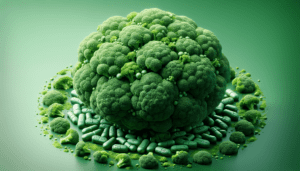Broccoli’s Nutritional Profile
Broccoli is a highly nutritious vegetable, packed with an array of vitamins and minerals that contribute to its health benefits. Understanding its nutritional profile can provide insight into why broccoli is often recommended for a healthy diet.
Vitamins in Broccoli
Broccoli is rich in various vitamins, essential for maintaining good health and preventing diseases. The most notable vitamins in broccoli include:
| Vitamin | Amount per 100g | % Daily Value (DV) |
|---|---|---|
| Vitamin C | 89.2 mg | 99% |
| Vitamin K | 101.6 mcg | 85% |
| Vitamin A | 623 IU | 12% |
| Folate (B9) | 63 mcg | 16% |
| Vitamin B6 | 0.2 mg | 9% |
Vitamin C is a powerful antioxidant that helps protect the body against free radicals, which can lead to cancer. In addition, Vitamin K plays a crucial role in blood clotting and bone health, while Folate is essential for DNA synthesis and repair, making broccoli beneficial for pregnancy. For more on the nutritional value of broccoli, check our dedicated article.
Minerals in Broccoli
Broccoli also contains a variety of essential minerals that support various bodily functions. Key minerals found in broccoli include:
| Mineral | Amount per 100g | % Daily Value (DV) |
|---|---|---|
| Calcium | 47 mg | 5% |
| Iron | 0.7 mg | 4% |
| Magnesium | 21 mg | 5% |
| Potassium | 316 mg | 9% |
| Phosphorus | 66 mg | 5% |
Calcium is vital for bone health, while Iron is crucial for the formation of red blood cells. Magnesium plays a role in over 300 enzymatic reactions in the body, and Potassium helps in maintaining normal blood pressure. For more on how these minerals contribute to broccoli and heart health, visit our detailed guide.
Broccoli’s rich nutritional profile makes it an excellent addition to any diet, offering numerous health benefits and aiding in cancer prevention. For more insights into the health benefits of broccoli, explore our comprehensive articles.
Health Benefits of Broccoli
Broccoli is not only a versatile vegetable but also a powerhouse of nutrients that confer various health benefits. This section explores how broccoli aids in cancer prevention and promotes heart health.
Broccoli and Cancer Prevention
Broccoli has been extensively studied for its potential role in cancer prevention. This cruciferous vegetable contains several bioactive compounds that contribute to its anti-cancer properties.
Key Compounds in Broccoli
| Compound | Function |
|---|---|
| Sulforaphane | Inhibits cancer cell growth |
| Indole-3-carbinol | Promotes detoxification of carcinogens |
| Glucoraphanin | Precursor to sulforaphane |
Sulforaphane, a sulfur-rich compound found in broccoli, has been shown to inhibit the growth of cancer cells and even promote their destruction. Indole-3-carbinol, another compound in broccoli, aids in detoxifying harmful carcinogens. Glucoraphanin, which converts into sulforaphane, further amplifies these effects.
Studies suggest that regular consumption of broccoli may lower the risk of various cancers, including breast, prostate, and colon cancer. To learn more about these benefits, visit our detailed guide on broccoli and cancer prevention.
Broccoli and Heart Health
In addition to its anti-cancer properties, broccoli is also beneficial for heart health. This vegetable is rich in fiber, antioxidants, and essential nutrients that promote cardiovascular well-being.
Nutrients in Broccoli for Heart Health
| Nutrient | Benefit |
|---|---|
| Fiber | Lowers cholesterol levels |
| Potassium | Regulates blood pressure |
| Antioxidants | Reduces oxidative stress |
Broccoli’s high fiber content helps in lowering cholesterol levels, which is crucial for maintaining a healthy heart. Potassium, another vital nutrient found in broccoli, aids in regulating blood pressure. Antioxidants like vitamin C and beta-carotene present in broccoli help reduce oxidative stress, thereby minimizing the risk of heart disease.
For a comprehensive overview of how broccoli supports cardiovascular health, check out our article on broccoli and heart health.
Incorporating broccoli into your diet can provide numerous health benefits, from cancer prevention to improved heart health. For more information on the nutritional value of this vegetable, visit our page on the nutritional value of broccoli.
Cooking and Serving Broccoli
Broccoli is a versatile vegetable that can be prepared and enjoyed in numerous ways. To maximize its health benefits, especially in relation to broccoli and cancer prevention, it’s crucial to use the best cooking methods and pair it with complementary foods.
Best Cooking Methods
The way broccoli is cooked can significantly impact its nutritional value, particularly its cancer-preventing properties. Here are some of the best methods:
Steaming
Steaming is one of the best methods to preserve the nutrients in broccoli. It helps retain the high levels of vitamins and minerals, which are essential for cancer prevention.
Stir-Frying
Stir-frying broccoli in a small amount of healthy oil, like olive oil, can enhance its flavor and retain its nutritional benefits. This method also allows for quick cooking, which helps preserve its vital nutrients.
Roasting
Roasting broccoli can bring out a rich, caramelized flavor. This method involves cooking the vegetable at high heat, which can help maintain its vitamin and mineral content.
| Cooking Method | Vitamin Retention (%) | Mineral Retention (%) |
|---|---|---|
| Steaming | 90 | 88 |
| Stir-Frying | 85 | 81 |
| Roasting | 80 | 78 |
Pairing Broccoli with Other Foods
Pairing broccoli with other nutrient-dense foods can enhance its health benefits and make for a delicious meal. Here are some great combinations:
Broccoli and Garlic
Garlic is known for its anti-inflammatory properties. Pairing it with broccoli can create a flavorful dish that supports overall health.
Broccoli and Lemon
Lemon adds a zesty flavor and a boost of vitamin C, which can aid in the absorption of iron from broccoli.
Broccoli and Almonds
Almonds provide a crunchy texture and are rich in healthy fats and proteins, making them a perfect complement to broccoli.
For more information on the nutritional value of broccoli and how it pairs with other foods, explore our detailed guides. If you’re interested in how broccoli contributes to overall health, check out our articles on broccoli and heart health and broccoli and digestion.
Incorporating Broccoli into Your Diet
Including broccoli in your daily meals can significantly boost your intake of essential nutrients and contribute to overall health, particularly in the context of broccoli and cancer prevention. Here, we explore some delicious broccoli recipes and ways to serve broccoli as a side dish.
Broccoli Recipes
Broccoli can be a versatile ingredient in a variety of dishes. Here are some recipes to help you incorporate this nutrient-rich vegetable into your diet:
Broccoli Stir-Fry
- Ingredients:
- 2 cups broccoli florets
- 1 bell pepper, sliced
- 1 carrot, sliced
- 2 tablespoons soy sauce
- 1 tablespoon olive oil
- 2 cloves garlic, minced
- 1 teaspoon ginger, minced
- Salt and pepper to taste
- Instructions:
- Heat olive oil in a pan over medium heat.
- Add garlic and ginger, sauté for 1 minute.
- Add broccoli, bell pepper, and carrot. Stir-fry for 5-7 minutes.
- Pour in soy sauce, and season with salt and pepper.
- Cook for another 2 minutes and serve hot.
Broccoli Soup
- Ingredients:
- 3 cups broccoli florets
- 1 onion, chopped
- 2 cloves garlic, minced
- 4 cups vegetable broth
- 1 cup coconut milk
- Salt and pepper to taste
- Instructions:
- In a large pot, sauté onions and garlic until translucent.
- Add broccoli and vegetable broth. Bring to a boil.
- Reduce heat and simmer for 15 minutes.
- Blend the mixture until smooth.
- Stir in coconut milk, and season with salt and pepper.
- Serve warm.
For more ideas on how to use broccoli in your meals, check out our article on broccoli recipes.
Broccoli as a Side Dish
Broccoli can be a fantastic side dish that complements a wide range of main courses. Here are some simple and tasty ways to serve broccoli:
| Method | Ingredients | Instructions |
|---|---|---|
| Steamed Broccoli | 2 cups broccoli florets, Salt, Lemon juice | Steam broccoli until tender. Season with salt and a squeeze of lemon juice. |
| Roasted Broccoli | 2 cups broccoli florets, Olive oil, Salt, Pepper, Garlic powder | Toss broccoli with olive oil, salt, pepper, and garlic powder. Roast at 400°F for 20 minutes. |
| Broccoli Salad | 2 cups broccoli florets, 1/4 cup red onion (chopped), 1/4 cup raisins, 1/4 cup sunflower seeds, 1/2 cup vegan mayo, 1 tablespoon apple cider vinegar | Mix all ingredients together in a bowl. Chill before serving. |
Adding broccoli as a side dish not only enhances the flavor of your meal but also ensures you get the myriad health benefits this vegetable offers. For more information on the nutritional value of broccoli and its health benefits, visit our other articles.


